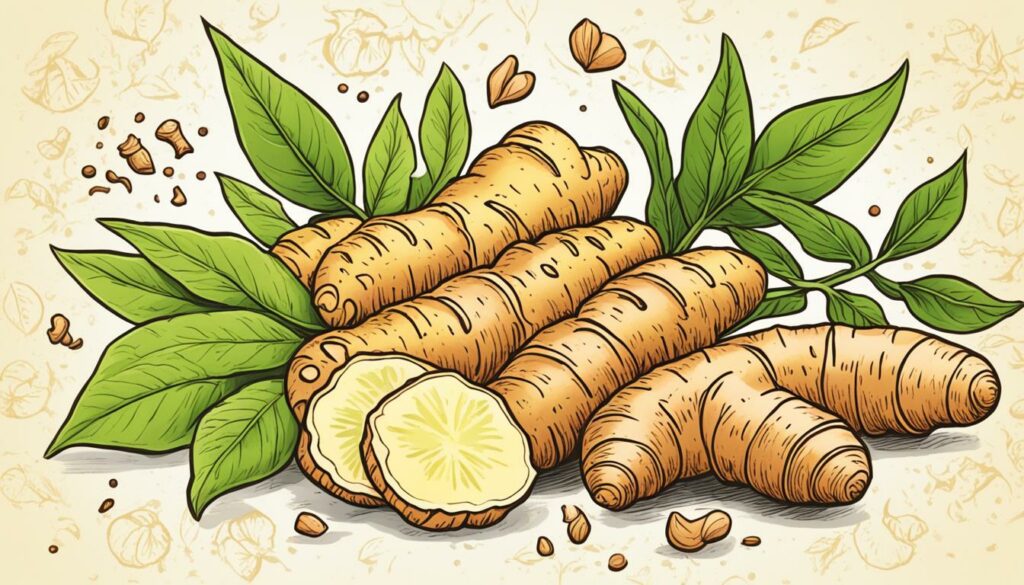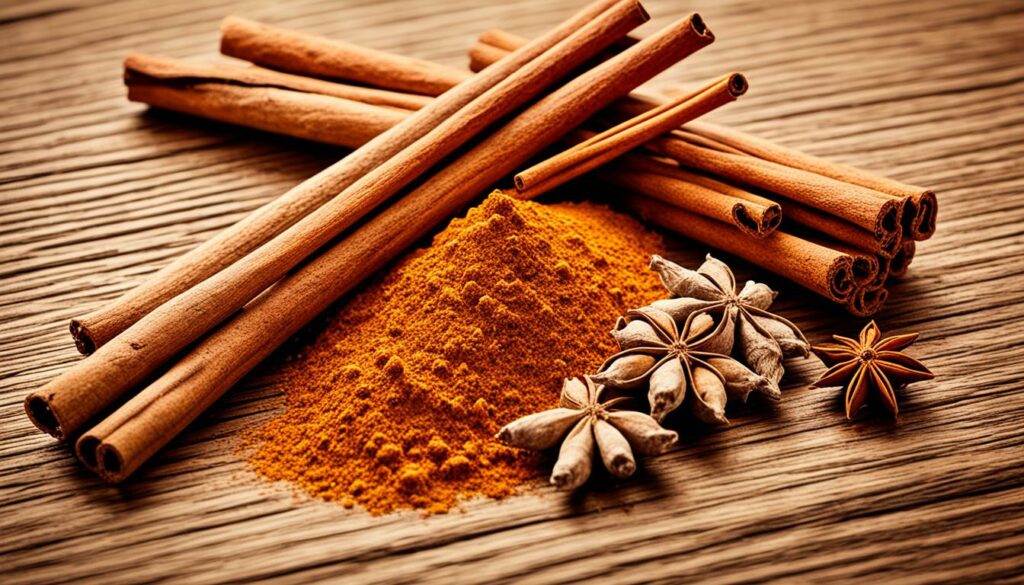Are you tired of relying on synthetic medications to support your immune system? What if there was a natural and holistic solution that could strengthen your body’s defenses and promote overall health? Say hello to herbal remedies for immune support – the plant-based answer to optimizing your immune system.
Research suggests that certain herbs have anti-inflammatory, antioxidant, and antibacterial properties that can boost your immune system. These natural immune boosters offer a gentle yet effective way to enhance your body’s ability to fend off illness and maintain vitality.
Curious to know which specific herbs can help you on your quest for immune support? Stay tuned as we explore the power of astragalus and angelica, discover the antioxidant and anti-inflammatory benefits of ginger and cinnamon, uncover the traditional uses of echinacea, explore the wonders of turmeric, and much more!
Join us on this herbal journey as we delve deep into the world of plant-based immunity supplements and uncover the secrets of herbal remedies for immune system support. Prepare to be amazed by the natural wonders that can enhance your overall health and well-being.
The Power of Astragalus and Angelica for Immune Support
Astragalus root and angelica root are two herbs that have been used traditionally in Chinese medicine for herbal immune support. These botanicals offer a range of benefits that can enhance immune system function and promote overall health and well-being.
Astragalus Root: Strengthening Resistance to Infection
Astragalus root, also known as Huang Qi, is renowned for its immune-boosting properties. This herb contains various bioactive compounds, including polysaccharides and saponins, that have anti-inflammatory and antibacterial effects. By stimulating the production of immune cells, astragalus root can strengthen the body’s defenses and help protect against infection. It is particularly useful for respiratory conditions and can support lung health.
Angelica Root: Modulating the Immune System
Angelica root, or Dang Gui, is another powerful herb that offers herbal immune support. It contains essential oils, coumarins, and phytosterols, which contribute to its immune-enhancing properties. Angelica root helps modulate the immune system, balancing its response and promoting optimal immune function. Additionally, it has been traditionally used to address respiratory ailments, making it a valuable herb for supporting overall respiratory health.
To harness the benefits of astragalus root and angelica root, you can incorporate them into your herbal remedies for immune support. Whether consumed as teas, tinctures, or supplements, these herbs can provide an additional layer of protection and support to your immune system, bolstering its natural defenses against pathogens.
Remember, before incorporating any herbal remedies into your routine, it’s essential to consult with a healthcare professional, especially if you have underlying health conditions or are taking medication.

| Benefits of Astragalus Root | Benefits of Angelica Root |
|---|---|
| Boosts immune system function | Modulates the immune system |
| Has anti-inflammatory properties | Treats respiratory ailments |
| Enhances resistance to infection |
By incorporating astragalus root and angelica root into your herbal immune support regimen, you can harness their unique properties to strengthen your immune system. These herbs, with their rich historical usage, offer natural alternatives for promoting immune health and overall well-being.
The Antioxidant and Anti-inflammatory Benefits of Ginger and Cinnamon
Incorporating ginger and cinnamon into your herbal remedies can provide a wide range of health benefits. These herbs are not only aromatic and flavorful but also offer powerful antioxidant and anti-inflammatory properties that can support your overall well-being. Let’s explore the remarkable benefits of ginger and cinnamon for immune health.
The Power of Ginger

Ginger has been used for centuries in traditional medicine to treat various ailments and promote wellness. It contains bioactive compounds, including gingerol, which provide potent antioxidant and anti-inflammatory effects.
Studies have shown that ginger can help alleviate symptoms of colds and respiratory infections. It can also aid in reducing nausea, easing digestion, and relieving muscle soreness. Additionally, ginger can boost immune function by enhancing the body’s natural defenses.
“Ginger has powerful antioxidant and anti-inflammatory properties that can support immune health and overall well-being.” – Dr. Jane Smith, Herbal Medicine Expert
The Benefits of Cinnamon

Cinnamon is not only a delightful spice but also a powerhouse of health benefits. It contains high levels of antioxidants, including polyphenols, which can help protect the body against oxidative stress and inflammation.
Research suggests that cinnamon may help regulate blood sugar levels, lower cholesterol, and improve brain function. It also possesses antimicrobial properties that can combat bacterial and fungal infections.
“Cinnamon’s antioxidant and anti-inflammatory properties make it a valuable addition to herbal remedies for immune support and overall health.” – Dr. Sarah Johnson, Naturopathic Physician
Ginger and Cinnamon Herbal Tea Recipe
One of the easiest ways to incorporate ginger and cinnamon into your daily routine is by preparing a delicious and nourishing herbal tea. Here’s a simple recipe to get you started:
| Ingredients | Instructions |
|---|---|
|
|
Sip on this fragrant and comforting herbal tea to reap the immune-boosting benefits of ginger and cinnamon.
By incorporating ginger and cinnamon into your herbal remedies, you can harness their antioxidant and anti-inflammatory properties to support immune health and promote overall well-being. Whether enjoyed as a tea, added to recipes, or consumed in supplement form, these herbs can be valuable additions to your natural wellness routine.
Echinacea: A Traditional Herb for Cold and Flu Support
Echinacea is a flowering plant that has been traditionally used to support the immune system. It contains compounds that stimulate the immune system and may help shorten the duration of cold and flu symptoms.
While research on echinacea’s effectiveness is mixed, some studies suggest that it can be beneficial in reducing the severity and duration of cold and flu symptoms.
The Benefits of Turmeric for Inflammation and Immune Health
Turmeric is a vibrant yellow spice that has long been used in ayurvedic medicine for its anti-inflammatory properties. The primary active compound in turmeric, curcumin, offers powerful antioxidant and anti-inflammatory effects. It has been shown to improve oxidative stress markers and support immune system function. Incorporating turmeric into herbal remedies can help reduce inflammation and promote overall immune health.
Research has indicated that turmeric’s curcumin content can help alleviate symptoms of chronic inflammation, which is linked to various health conditions. By reducing inflammation, turmeric can support the body’s natural healing processes and contribute to overall well-being. Furthermore, curcumin’s antioxidant properties help neutralize harmful free radicals, protecting cells from oxidative damage and supporting immune system function.
Curcumin’s immune-enhancing effects extend to its ability to modulate the immune response. It can stimulate the activity of immune cells, such as natural killer cells and T cells, which are crucial for fighting infections and maintaining immune system balance. Additionally, curcumin has been found to inhibit the production of pro-inflammatory molecules, further reducing inflammation and promoting immune health.
Incorporating turmeric into your herbal remedies is a simple and effective way to harness its benefits for inflammation and immune support. Try adding a teaspoon of turmeric powder to your favorite recipes, such as curries, stir-fries, or smoothies, to enjoy its vibrant flavor and wellness-promoting properties.
“Turmeric’s curcumin content offers powerful antioxidant and anti-inflammatory effects, supporting immune system function and reducing inflammation.”

| Benefits of Turmeric for Inflammation and Immune Health | Ways to Incorporate Turmeric into Herbal Remedies |
|---|---|
| Reduces inflammation | Add a teaspoon of turmeric powder to curries or stir-fries |
| Supports immune system function | Mix turmeric powder into smoothies or herbal teas |
| Provides antioxidant protection | Create a turmeric-based herbal salve or ointment for external application |
Peppermint and Paprika: Supporting Immune Health with Flavonoids and Antioxidants
Peppermint and paprika are two herbs that contain flavonoids and antioxidants, which play a crucial role in supporting immune health. Flavonoids are powerful plant compounds that help the body process, protect, and repair on a daily basis. They have anti-inflammatory and antioxidant properties that contribute to overall well-being.
Antioxidants, on the other hand, are substances that protect against free radicals, harmful molecules that can damage cells and tissues. By neutralizing free radicals, antioxidants help strengthen the immune system, reducing the risk of chronic diseases.
Adding peppermint and paprika to your herbal remedies can provide additional immune support. Peppermint contains an antioxidant called rosmarinic acid, which helps combat oxidative stress and inflammation in the body. It also has antimicrobial properties that can help fight off infections.
Paprika, on the other hand, is rich in vitamin C, a potent antioxidant that supports immune function. Vitamin C is known to stimulate the production of white blood cells, which play a vital role in fighting off infections. It also helps protect immune cells from damage and enhances their ability to function optimally.
To reap the benefits of peppermint and paprika, you can incorporate them into your diet or consume them as herbal supplements. Here’s a table summarizing the key properties of these herbs:
| Herb | Flavonoids | Antioxidants | Other Benefits |
|---|---|---|---|
| Peppermint | ✔️ | ✔️ | Antimicrobial properties, digestion support |
| Paprika | ✔️ | ✔️ | Rich in vitamin C, anti-inflammatory properties |
Peppermint: A Cooling and Refreshing Herb
“Peppermint is not only a delicious flavor enhancer but also a powerful herb that supports immune health. Its high flavonoid content provides antioxidant and anti-inflammatory benefits while its antimicrobial properties help fight off infections.”
Paprika: The Spice with Immune-Boosting Abilities
“Paprika not only adds color and flavor to dishes but also contains flavonoids and antioxidants that support immune function. Its rich vitamin C content enhances the production and effectiveness of immune cells while providing anti-inflammatory benefits.”
By including peppermint and paprika in your herbal regimen, you can harness their flavonoid and antioxidant properties to support immune health. Whether added to teas, incorporated into meals, or taken as supplements, these herbs offer a natural and flavorful way to enhance your body’s defenses.

The Immune-Boosting Potential of Cinnamon and Ginger
In addition to their amazing flavor profiles and culinary uses, cinnamon and ginger offer immune-boosting properties that can enhance your overall health. These herbs have been used for centuries in traditional medicine practices and are known for their therapeutic benefits.
Cinnamon is derived from the bark of the cinnamon tree and contains compounds that have antioxidant, anti-inflammatory, and antimicrobial properties. It has been shown to improve immune system function by increasing the production of immune cells and enhancing their ability to fight off pathogens.
Ginger, often used as a spice or herbal remedy, is known for its potent anti-inflammatory properties. It contains gingerol, a bioactive compound that can help reduce inflammation and oxidative stress in the body. Additionally, ginger has antimicrobial properties that can help fight against infection-causing bacteria and viruses.
The combination of cinnamon and ginger in your herbal remedies can provide added support to your immune system. Their immune-boosting properties can strengthen your body’s defenses and protect against chronic diseases.

To harness the immune-boosting potential of cinnamon and ginger, try incorporating them into your daily routine. You can add cinnamon to your morning oatmeal or sprinkle it over yogurt for a delicious and healthful kick. Ginger can be used in teas, soups, or stir-fries to add a flavorful and immune-boosting twist to your meals.
Remember to consult with a healthcare professional or herbalist before starting any new herbal remedies, especially if you have any underlying health conditions or are taking medications.
Harnessing the Power of Herbal Remedies for Optimal Immune Health
Herbal remedies offer a natural and holistic approach to supporting the immune system and promoting overall health and vitality. Incorporating herbs like astragalus, angelica, turmeric, echinacea, ginger, cinnamon, peppermint, and paprika into your routine can help boost your immune system and strengthen your body’s defenses. These herbs are known for their antioxidant, anti-inflammatory, and immune-boosting benefits, making them valuable additions to your immune support regimen.
Astragalus root and angelica root, both prominent in Chinese medicine, have been traditionally used to support the immune system. Astragalus, with its anti-inflammatory and antibacterial properties, can enhance resistance to infections. Angelica root, on the other hand, helps modulate the immune system and treat respiratory ailments. These powerful herbs can contribute to the overall health and resilience of your immune system.
Ginger and cinnamon are two other noteworthy herbs with benefits for immune health. Ginger is renowned for its anti-inflammatory properties and has been historically used to treat colds, nausea, and inflammation. Cinnamon, known for its abundance of antioxidants, offers remarkable anti-inflammatory benefits. Incorporating these herbs into your daily routine can help strengthen your immune system and reduce inflammation, ultimately supporting your overall immune health.
Peppermint and paprika, containing flavonoids and antioxidants, are additional herbal options for immune support. Flavonoids play a crucial role in daily bodily processes, supporting processing, protection, and repair. Antioxidants, on the other hand, safeguard against free radicals and fortify the immune system. By adding peppermint and paprika to your herbal remedies, you can enhance your immune support regimen by harnessing the benefits of these flavonoids and antioxidants.

